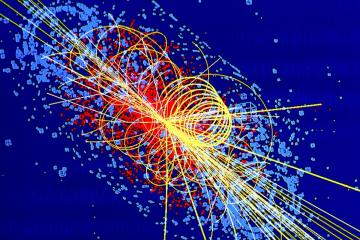Metaphysics of Entanglement

The ‘Metaphysics of Entanglement’ project is a major research programme at the University of Oxford, funded by the Templeton World Charity Foundation. It pursues in new research domains some of lines of inquiry of the ‘Power Structuralism in Ancient Ontologies’ project, funded by the European Research Council and also based at the University of Oxford. Both projects are directed by Dr Anna Marmodoro and jointly involve a large group of researchers, at senior as well as post-doctoral level.
The ‘Metaphysics of Entanglement’ project is interdisciplinary in nature and thus involves researchers from Physics and Philosophy. It is concerned with a wide range of philosophical questions, ranging from philosophy of physics to metaphysics in general and philosophy of religion.
Entanglement phenomena can generally be characterised as those where the behaviour and properties of parts of a complex whole cannot be described and understood independently from the behaviour of the other parts (and of the complex as such). The probably best-known instance of this is quantum entanglement, which is one of the phenomena of the greatest interest in quantum mechanics. There are states of composite systems (a pair of particles, say) that cannot be “factorized” into separate states for the component subsystems (i.e. of the particles considered in isolation). In such a case, it seems natural to say that “the whole is more than the sum of its parts''. But the philosophical challenge is to provide a precise characterization of this metaphorical idea that is compatible with a plausible general metaphysical theory. Various such characterisations have been offered for the case of quantum entanglement. Perhaps the particles are tied together by some novel class of relations; perhaps there are not really two distinct particles at all, and the whole (rather than its parts) should be considered as fundamental; perhaps it is a mistake to think of the world as at all made of separate objects. One central aim of this project is to explore these various options for the metaphysics of quantum entanglement, and to develop the theoretical constraints that any viable philosophical account of these phenomena will have to meet.
We are also interested in exploring other phenomena that might be understood as cases of entanglement. One other major area of research for the project team is in the philosophy of religion, and specifically interpreting the metaphysics of the (Christian) doctrines of the incarnation and the Trinity. For instance, project members will investigate whether ideas that have proved fruitful for understanding entanglement in the quantum realm can also be applied to provide fresh insights for a philosophical/intellectual understanding of the Trinity, where the Father, Son and Spirit are three persons but all God.
In attempting to understand entanglement phenomena, one promising line of enquiry comes from the project on Power Structuralism. Among other things, this project will investigate the application of the insights of that metaphysical approach for accounting for the entanglement phenomena. We believe that in doing so, we will be able to develop fruitful new strategies to account for entanglement phenomena, and, at the same time, be able to locate the explanation of these phenomena in a promising general metaphysical framework.
If you are interested in learning more about the ‘Metaphysics of Entanglement’ project and its activities, as well as ways of getting involved, please visit: http://www.metaphysics-of-entanglement.ox.ac.uk
For more information on the Power Stucturalism project, please visit https://www.torch.ox.ac.uk/power-structuralism
Contact:
Dori Castillo Aranda
quantum@philosophy.ox.ac.uk
Metaphysics of Entanglement

The Metaphysics of Entanglement and Power Structuralism projects hosted two conferences.
- Anjan Chakravartty (University of Notre Dame)
- Stephen Barker (University of Nottingham)
- David S Oderberg (University of Reading)
- Barbara Vetter (Humboldt-Universität zu Berlin, Germany)


